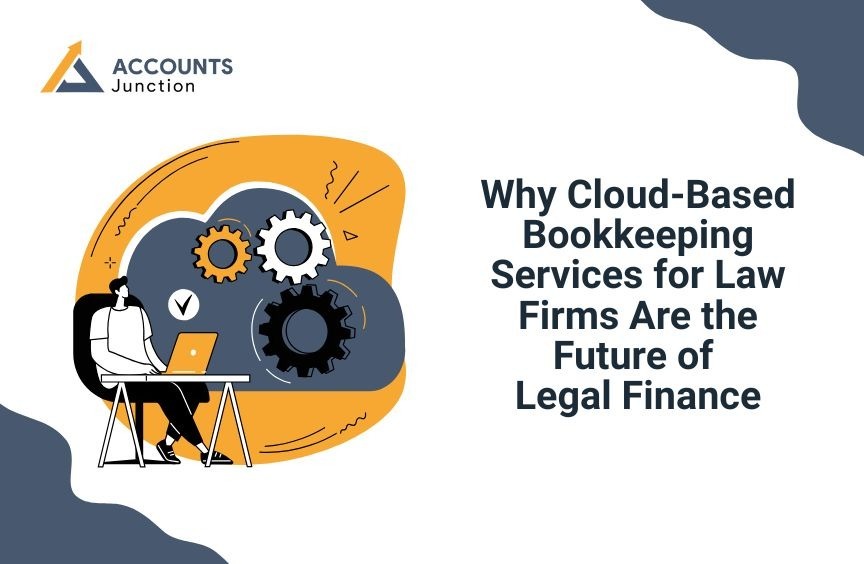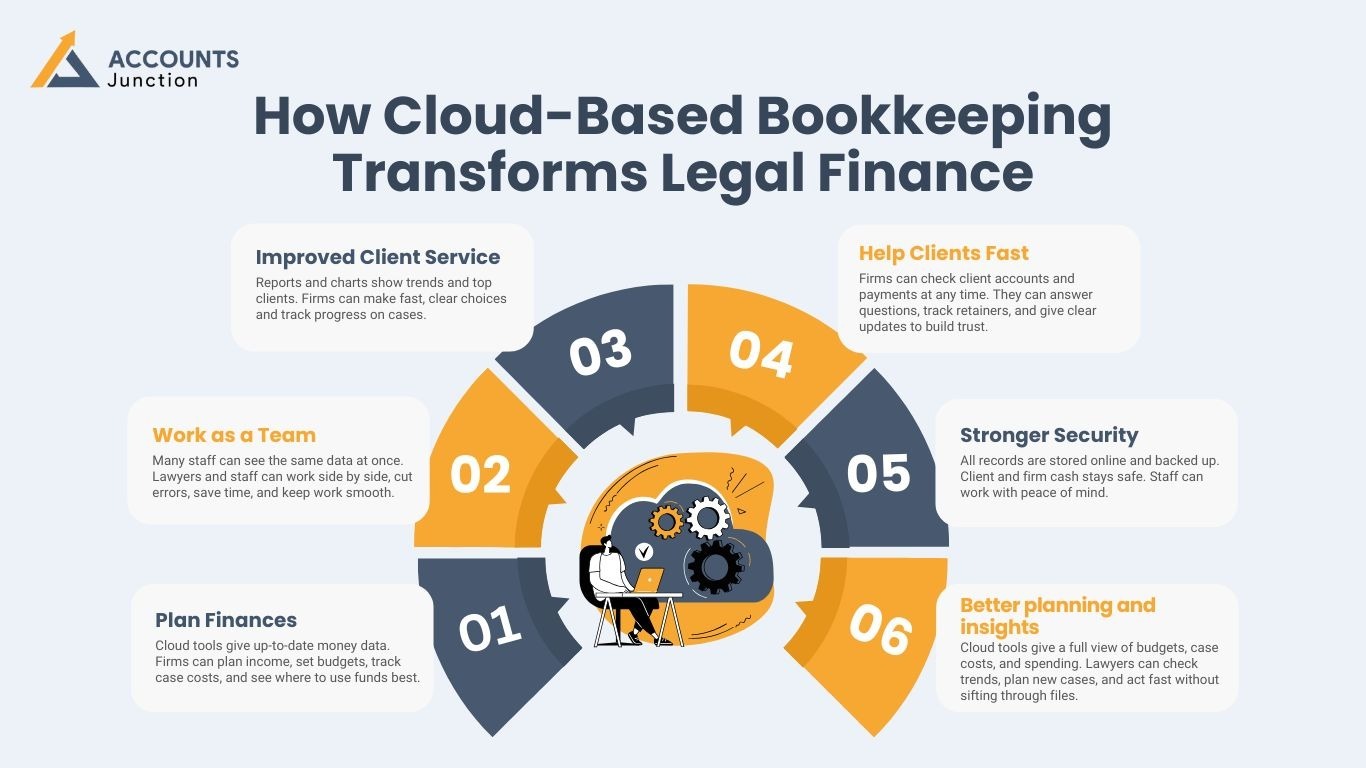
Why Cloud-Based Bookkeeping Services for Law Firms Are the Future of Legal Finance
Cloud-Based Bookkeeping Services for Law Firms help track all money and client accounts with ease. Payments, bills, and records stay clear and up to date. Lawyers and staff can see accounts at any time, which makes work faster and cuts mistakes. Cloud systems keep data safe and let more than one person work on books at the same time. Firms can check reports quickly and plan their spend with ease.
Many law firms now use cloud bookkeeping. It saves time, lowers errors, and gives a clear view of all the money. In this blog, we will show why cloud bookkeeping is key for law firms, how it works, and what benefits it brings to legal finance.
Understanding Bookkeeping Services for Law Firms
Bookkeeping services for law firms involve managing financial records, tracking client payments, and ensuring compliance with tax and industry regulations. Unlike regular businesses, law firms often handle trust accounts, retainers, and client-specific transactions. This makes bookkeeping more complex and prone to errors if not managed properly.
The Role of Bookkeeping in Legal Practice
Bookkeeping is not just about numbers. For law firms, accurate financial records are crucial to:
- Track billable hours and client invoices
- Manage trust accounts
- Ensure compliance with the law.
- Make informed business decisions.
Cloud-Based Bookkeeping Services for Law Firms cut errors, speed up work, and make finance management simple and precise.
Cloud-based bookkeeping means handling all money records online through safe systems. Instead of using spreadsheets or local programs, law firms can check records anytime, from any place. Cloud tools also let several staff members
work at once and keep a full log of all transactions.
Key Features of Cloud-Based Bookkeeping Services for Law Firms
- Real-Time Access – Law firms can see all money and bills right away. Lawyers and staff can check funds, track cash, and update logs fast.
- Automated Work – Bills, cash, and reports are done by the cloud. Staff save time, make fewer mistakes, and keep all work clear.
- Strong Security – Data is safe, backed up, and kept online. Client and firm cash records stay safe, so staff can work with peace of mind.
- Tool Link – Works with other firm tools like case files, billing, and plans. Staff can see all work in one spot, which makes tasks easy.
- Clear Reports – Shows case cost, budgets, and firm funds. Lawyers can plan, spend, check trends, and make smart choices with ease.
Cloud bookkeeping cuts mistakes, speeds up work, and makes money tracking easy, clear, and useful for the whole firm.
Benefits of Cloud-Based Bookkeeping Services for Law Firms
Switching to cloud bookkeeping gives law firms many advantages and helps run the firm more smoothly.
Time Efficiency
- Manual bookkeeping takes too much time. Cloud systems do math, make reports fast, and keep work flowing. This saves hours that lawyers and staff can spend on clients and cases.
Cost Savings
- Hiring a full-time bookkeeper or accountant costs a lot. Cloud services lower these costs while giving skilled financial help. Firms can scale up or down without paying extra.
Accuracy and Compliance
- Mistakes in legal money can bring fines or harm the firm’s reputation. Cloud bookkeeping keeps records correct and follows the rules with automated checks.
Improved Client Management
- With real-time data, firms can track client accounts, payments, and retainers. This makes service faster, clearer, and builds trust.
Better Planning
- Cloud systems give clear reports and overviews, helping lawyers plan budgets, costs, and case spending more smartly.
Team Collaboration
- Multiple staff can access data at the same time. This keeps teams in sync and reduces work delays or missed tasks.
Security and Backup
- All data is kept safe online with copies stored regularly. Client and firm money records stay secure at all times.
Using Cloud-Based Bookkeeping Services for Law Firms also allows teams to track client funds in real time and ensures all financial work stays accurate and up to date.
How Cloud-Based Bookkeeping Transforms Legal Finance
Cloud-Based Bookkeeping Services for Law Firms are more than tools; they transform how money and records are managed. It saves time, cuts mistakes, and keeps work smooth.
Plan Finances
- Cloud tools give up-to-date money data. Firms can plan income, set budgets, track case costs, and see where to use funds best.
Work as a Team
- Many staff can see the same data at once. Lawyers and staff can work side by side, cut errors, save time, and keep work smooth.
Improved Client Service
- Reports and charts show trends and top clients. Firms can make fast, clear choices and track progress on cases.
Help Clients Fast
- Firms can check client accounts and payments at any time. They can answer questions, track retainers, and give clear updates to build trust.
Stronger Security
- All records are stored online and backed up. Client and firm cash stays safe. Staff can work with peace of mind.
Better planning and insights
- Cloud tools give a full view of budgets, case costs, and spending. Lawyers can check trends, plan new cases, and act fast without sifting through files.

Why Law Firms Are Embracing Cloud-Based Bookkeeping
Many law firms are now adopting cloud-based bookkeeping services for the following reasons:
- Remote Accessibility: Lawyers can check finances from anywhere.
- Reduced Risk: Less chance of errors, data loss, or fraud.
- Scalability: Services can grow with the firm.
- Better Client Experience: Timely billing and payment management improve trust.
Switching to cloud bookkeeping is no longer optional—it is becoming essential for modern legal finance.
Choosing the Right Bookkeeping Services for Law Firms
Selecting the right provider is critical to ensure smooth operations and compliance. Here are some key considerations:
Security and Compliance
- The provider must ensure data encryption, regular backups, and compliance with legal accounting standards.
Experience in Legal Finance
- Not all bookkeeping services understand law firm operations. Look for providers experienced in handling trust accounts, retainers, and legal-specific transactions.
Integration and Support
- The service should integrate with your current systems and provide ongoing support to address any technical or financial issues.
Look for providers that offer Cloud-Based Bookkeeping Services for Law Firms with built-in compliance tools and easy integration with your current systems.
Future Trends in Cloud-Based Bookkeeping for Law Firms
The future of legal finance is closely tied to cloud technology. Law firms can expect tools that save time, reduce mistakes, and give a clear view of all finances.
AI and Automation
- Artificial intelligence will further automate repetitive tasks, spot errors, and give insights fast. It will help staff focus on important work and reduce time spent on routine checks.
Mobile Solutions
- Lawyers will manage finances through mobile apps more often, checking accounts, payments, and budgets on the go. This keeps work smooth even when they are out of the office.
Predictive Analytics
- Cloud bookkeeping will offer predictive insights that help firms see future cash flow and costs. Firms can plan spending, forecast growth, and make smart choices based on data.
Cloud bookkeeping is changing how law firms track money and records. It speeds up work, cuts mistakes, and lets lawyers and staff focus on clients. Firms can check all accounts anytime, track payments, plan budgets, and stay within the law. These services also improve teamwork, client care, and daily workflow, making the firm stronger and ready to grow.
At Account Junction, we help law firms manage all their books with ease. Our team uses safe cloud tools, live updates, and clear reports so lawyers can focus on cases, not spreadsheets. With our help, firms stay accurate, follow the rules, and grow with confidence. Partner with us today to see how we can simplify your bookkeeping and keep your finances safe and clear.
FAQs
1. What are cloud bookkeeping services for law firms?
- It is a way to track all money and client accounts online, safely, and in real time.
2. How does it save time?
- The system automates calculations, bills, and reports, which frees staff and lawyers to focus on work.
3. Is cloud bookkeeping secure?
- Yes. Data is encrypted, backed up, and stored online to keep client and firm funds safe.
4. Can small firms use cloud bookkeeping?
- Yes. Even small firms can track accounts, plan budgets, and check payments easily.
5. Does it help with compliance?
- Yes. Cloud tools track client funds and follow legal rules to avoid errors or fines.
6. Can multiple staff work at the same time?
- Yes. Lawyers, accountants, and staff can all see and update records at once without delays.
7. Does it give clear reports?
- Yes. Firms can view budgets, case costs, and trends to plan smart financial moves.
8. Can it grow with the firm?
- Yes. Cloud bookkeeping can add features and support as the firm expands without extra staff.
9. What types of accounts can it manage?
- It can handle trust accounts, retainers, client bills, and firm income all in one place.
10. How does it reduce mistakes?
- By doing calculations and tracking changes automatically, the system lowers errors from manual work.
11. Can lawyers check accounts remotely?
- Yes. They can log in from any device and see all transactions anytime.
12. Will it help with client payments?
- Yes. Cloud tools track invoices, payments, and retainers so accounts stay clear and updated.
13. Does it support teamwork?
- Yes. Multiple staff can work on the same accounts at once without errors or confusion.
14. How does it help with planning?
- It shows trends, case costs, and budgets, helping firms make smart, fast decisions.
15. Is switching to cloud bookkeeping hard?
- No. Firms can move records safely, set permissions, and train staff with expert help.
